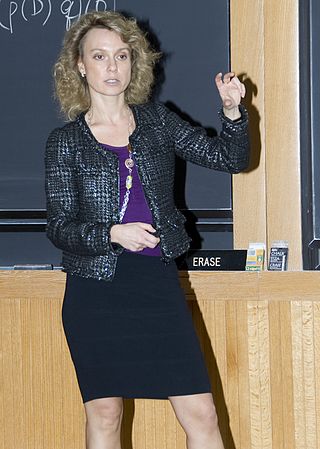
The Max Planck Society for the Advancement of Science is a formally independent non-governmental and non-profit association of German research institutes. Founded in 1911 as the Kaiser Wilhelm Society, it was renamed to the Max Planck Society in 1948 in honor of its former president, theoretical physicist Max Planck. The society is funded by the federal and state governments of Germany.

Feodor Felix Konrad Lynen was a German biochemist. In 1964 he won the Nobel Prize in Physiology or Medicine together with Konrad Bloch for their discoveries concerning the mechanism and regulation of cholesterol and fatty acid metabolism while he was director of the Max-Planck Institute for Cellular Chemistry in Munich.
The Humboldt Prize, the Humboldt-Forschungspreis in German, also known as the Humboldt Research Award, is an award given by the Alexander von Humboldt Foundation of Germany to internationally renowned scientists and scholars who work outside of Germany in recognition of their lifetime's research achievements. Recipients are "academics whose fundamental discoveries, new theories or insights have had a significant impact on their own discipline and who are expected to continue producing cutting-edge academic achievements in the future". The prize is currently valued at €60,000 with the possibility of further support during the prize winner's life. Up to one hundred such awards are granted each year. Nominations must be submitted by established academics in Germany.
Markus Aspelmeyer is an Austrian quantum physicist.

The Berlin-Brandenburg Academy of Sciences and Humanities, abbreviated BBAW, is the official academic society for the natural sciences and humanities for the German states of Berlin and Brandenburg. Housed in three locations in and around Berlin, Germany, the BBAW is the largest non-university humanities research institute in the region.
The Alexander von Humboldt Foundation of Germany bestows the Sofia Kovalevskaya Award every two years. Sofia Kovalevskaya (1850–1891) was the first major Russian female mathematician, who made important contributions to mathematical analysis, differential equations and mechanics, and the first woman appointed to a full professorship in Northern Europe. This prestigious award named in her honor is given to promising young academics to pursue their line of research in the sciences or arts and humanities. The foundation encourages applications from all areas of the academy so long as the investigator received a Ph.D. in the last six years and may be categorized as "top flight" by their publications and experience as commensurate with age.

Olga Holtz is a Russian mathematician specializing in numerical analysis. She received the Sofia Kovalevskaya Award in 2006 and the European Mathematical Society Prize (2008). Since 2008, she is a member of the Young Academy of Germany.

Martin Bodo Plenio is a German physicist, Alexander von Humboldt Professor, and Director of the Institute for Theoretical Physics at Ulm University.
Jochen Küpper FRSC is a German chemist and physicist, group leader at the Center for Free-Electron Laser Science, Deutsches Elektronen-Synchrotron DESY, and Professor of Physics and Professor by courtesy of Chemistry at the University of Hamburg, Germany.
Ilme Schlichting is a German biophysicist.

Benjamin Ziemann is a German historian who lectures at the University of Sheffield. Since 2011, he has been Professor of Modern German History at the Department of History, University of Sheffield.
Sigfried Bethke is a German physicist and science manager.
Rupert Huber is a German physicist and University professor. Huber is known for his research in terahertz technology and semiconductor physics.
The Alexander von Humboldt Professorship is an academic prize named after Alexander von Humboldt and awarded by the Alexander von Humboldt Foundation since 2008. The prize is intended to attract internationally leading scientists from abroad to Germany so that they can carry out top-level research there and strengthen Germany as a research location. The prize includes a permanent full professorship at the hosting university, plus 5 million euros for experimentally working scientists or 3.5 million euros for theoretically working scientists. This makes it the most highly endowed research prize in Germany, and possibly world-wide. A maximum of ten Alexander von Humboldt Professorships can be awarded every year to researchers of all disciplines. From 2020 to 2024, an additional six Humboldt Professorships in the field of artificial intelligence can be awarded each year.
Jens Meiler is a German-American biologist and structural chemist. He currently serves as a Professor of Chemistry and Associate Professor of Pharmacology and Biomedical Informatics at Vanderbilt University. His research focuses on protein structures and computational biology, drawing on interdisciplinary techniques from other sciences.

Katja Loos is professor at the Zernike Institute for Advanced Materials of the University of Groningen, The Netherlands holding the chair of Macromolecular Chemistry and New Polymeric Materials.
Ralf Metzler is a physicist that focuses on nonequilibrium statistical physics and anomalous stochastic processes, with applications to biological and soft matter systems. He currently is chair professor for theoretical physics at the University of Potsdam and is an Alexander von Humboldt Polish Honorary Research Fellow.

Christian Hertweck is a German chemist, deputy director and head of the department of biomolecular chemistry at the Leibniz Institute for Natural Products Research and Infection Biology.
Andrés Fabián Lasagni is an Argentinean, Italian and German materials scientist and laser expert. He is professor at the Technische Universität Dresden and leads the Chair for Laser-based Manufacturing.
Karl Martin Wolf is a German experimental physicist specializing in electron and optical spectroscopy and their use for studying the dynamical processes in solid state materials, surfaces, and interfaces. He is the current director of the Department of Physical Chemistry at the Fritz Haber Institute of the Max Planck Society in Berlin, Germany.








